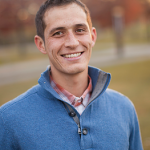About the Seminar:
The overarching goal of our group is to develop new methods to extract sustainable fuels and chemicals from plants. Our approach has been to develop and apply computational tools to both biological and chemical conversion processes as part of an iterative ‘model-validate-predict’ design process for de novo catalysts.
With its high carbon and hydrogen content, lignocellulosic biomass presents an alternative to petroleum as a nearly carbon-neutral precursor to upgraded liquid fuels. I will present some representative results in designing new catalysts for biological and chemocatalytic processes of biomass.
Our group has introduced a “Fuel property first” design approach to reduce emissions and increase performance. Traditional approaches for developing these mechanistic models require many years for each new molecule, a pace that is poorly suited to the large-scale search for new bioderived blendstocks. We have developed a quantitative structure-property relationship (QSPR) model for sooting tendency based on the experimental yield sooting index (YSI), developed by collaborators at Yale (Prof. L. Pfefferle and Dr. C. McEnally). This is the first fuel property predictive tool using ML (Machine Learning) approaches in combustion research. We have started to build kinetic mechanisms of soot precursor formation during combustion using DFT and flow reactor experiments (collaboration with Dr. R. McCormick, NREL) to show how the fundamental chemistry affects this practical engineering problem.
About the Speaker:
Seonah Kim is a senior scientist at NREL since 2011.
Her research background combines extensive experience in both classical molecular dynamics simulations and quantum mechanical modeling (DFT) of transition states. She has been working on understanding and designing catalysts for the decomposition of both lignin and cellulose. Her research areas contribute on both biochemical and thermochemical conversion projects based on a variety of biocatalysts and inorganic catalysts experiences. She expand her research by combining DFT and machine learning to predict fuel/chemical properties.
Seonah leads projects for autoignition properties determination project (DFT/machine learning), computational thermochemical conversion catalysts and also enzymatic engineering for biochemical conversion. She serves as a Chair (2020) for computational chemistry division (COMP) of American Chemical Society (ACS). Seonah receive a M. Sc. in Computer Science from University of Houston and a Ph. D. in Computational Chemistry from University of Florida.



